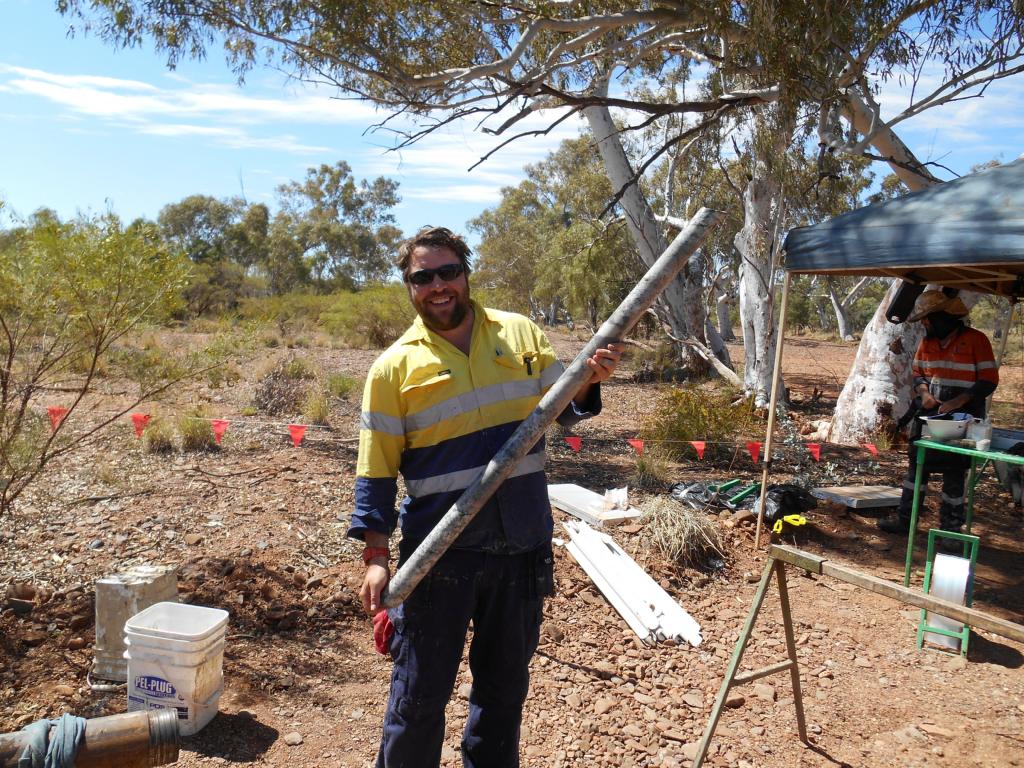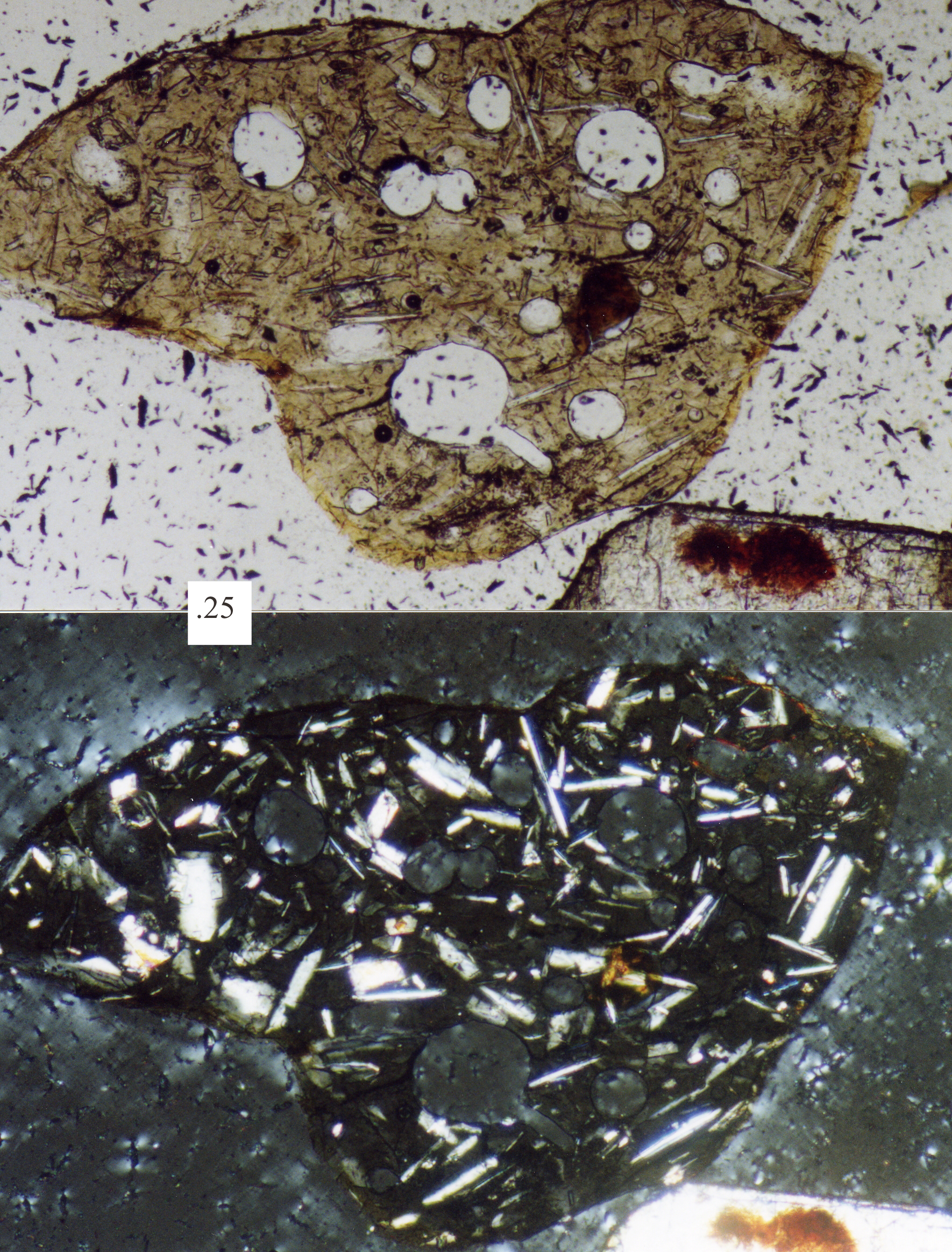|
Wissam S. Al-Hashimi
Dr. Wissam S. al-Hashimi was an Iraqi geologist born in Baghdad. He was Secretary General of the Union of Arab Geologists until his death in 2005. In 2001 he was elected president of the Geological Society of Iraq and was president of the Union of Arab Geologists. From 1996 to 2002 he was vice president of the International Union of Geological Sciences (IUGS). He was killed in late August or early September 2005. Academic career Wissam al-Hashimi received his B.Sc. degree in geology-physics from Baghdad University in 1965 and carried out his military service obligations. In 1967 he was employed as a demonstrator (tutor) in the University of Mosul. He did his Ph.D. at the University of Newcastle-upon-Tyne from 1968 to 1972, working on the sedimentology and dolomitization of the limestone member of the Carboniferous Middle Limestone Group of Northumberland, northeast England. He returned to Baghdad and held a number of positions in the Iraqi government, the Iraqi National Oil Com ... [...More Info...] [...Related Items...] OR: [Wikipedia] [Google] [Baidu] |
Iraq
Iraq,; ku, عێراق, translit=Êraq officially the Republic of Iraq, '; ku, کۆماری عێراق, translit=Komarî Êraq is a country in Western Asia. It is bordered by Turkey to Iraq–Turkey border, the north, Iran to Iran–Iraq border, the east, the Persian Gulf and Kuwait to the southeast, Saudi Arabia to the south, Jordan to Iraq–Jordan border, the southwest and Syria to Iraq–Syria border, the west. The Capital city, capital and largest city is Baghdad. Iraq is home to diverse ethnic groups including Iraqi Arabs, Kurds, Iraqi Turkmen, Turkmens, Assyrian people, Assyrians, Armenians in Iraq, Armenians, Yazidis, Mandaeans, Iranians in Iraq, Persians and Shabaks, Shabakis with similarly diverse Geography of Iraq, geography and Wildlife of Iraq, wildlife. The vast majority of the country's 44 million residents are Muslims – the notable other faiths are Christianity in Iraq, Christianity, Yazidism, Mandaeism, Yarsanism and Zoroastrianism. The official langu ... [...More Info...] [...Related Items...] OR: [Wikipedia] [Google] [Baidu] |
Arabic Language
Arabic (, ' ; , ' or ) is a Semitic languages, Semitic language spoken primarily across the Arab world.Semitic languages: an international handbook / edited by Stefan Weninger; in collaboration with Geoffrey Khan, Michael P. Streck, Janet C. E.Watson; Walter de Gruyter GmbH & Co. KG, Berlin/Boston, 2011. Having emerged in the 1st century, it is named after the Arabs, Arab people; the term "Arab" was initially used to describe those living in the Arabian Peninsula, as perceived by geographers from ancient Greece. Since the 7th century, Arabic has been characterized by diglossia, with an opposition between a standard Prestige (sociolinguistics), prestige language—i.e., Literary Arabic: Modern Standard Arabic (MSA) or Classical Arabic—and diverse vernacular varieties, which serve as First language, mother tongues. Colloquial dialects vary significantly from MSA, impeding mutual intelligibility. MSA is only acquired through formal education and is not spoken natively. It is ... [...More Info...] [...Related Items...] OR: [Wikipedia] [Google] [Baidu] |
2005 Deaths
This is a list of deaths of notable people, organised by year. New deaths articles are added to their respective month (e.g., Deaths in ) and then linked here. 2022 2021 2020 2019 2018 2017 2016 2015 2014 2013 2012 2011 2010 2009 2008 2007 2006 2005 2004 2003 2002 2001 2000 1999 1998 1997 1996 1995 1994 1993 1992 1991 1990 1989 1988 1987 See also * Lists of deaths by day * Deaths by year {{DEFAULTSORT:deaths by year ... [...More Info...] [...Related Items...] OR: [Wikipedia] [Google] [Baidu] |
Year Of Birth Missing
A year or annus is the orbital period of a planetary body, for example, the Earth, moving in its orbit around the Sun. Due to the Earth's axial tilt, the course of a year sees the passing of the seasons, marked by change in weather, the hours of daylight, and, consequently, vegetation and soil fertility. In temperate and subpolar regions around the planet, four seasons are generally recognized: spring, summer, autumn and winter. In tropical and subtropical regions, several geographical sectors do not present defined seasons; but in the seasonal tropics, the annual wet and dry seasons are recognized and tracked. A calendar year is an approximation of the number of days of the Earth's orbital period, as counted in a given calendar. The Gregorian calendar, or modern calendar, presents its calendar year to be either a common year of 365 days or a leap year of 366 days, as do the Julian calendars. For the Gregorian calendar, the average length of the calendar ye ... [...More Info...] [...Related Items...] OR: [Wikipedia] [Google] [Baidu] |
Violence Against Academics In Post-invasion Iraq
Since the 2003 invasion of Iraq, Iraqi academics have frequently been threatened with violence, kidnapped, or murdered. Although it is impossible to determine the exact scale of the violence and intimidation, the Iraqi Ministry of Higher Education reported that over 3,250 academics had fled the country between February and August 2006. According to the Iraqi Association of University Lecturers about 300 academics, including Ph.D.'s working in Iraqi government ministries and university administrators, had been killed before January, 2007. Other, less reliable, sources have placed the death toll as low as 20 and as high as 1,000. (Note that many facts in this article contradict other sources.) Prof. Mohammed A.F. Al-Rawi, a medical specialist, FRCS and president of Baghdad University, was killed in his clinic, in front of his wife and patients, on July 27, 2003. Prof. Abdul-Latif Ali al-Mayah, a humanities professor born in Basra, who had been chairman of the Arab World Research and ... [...More Info...] [...Related Items...] OR: [Wikipedia] [Google] [Baidu] |
Crude Oil
Petroleum, also known as crude oil, or simply oil, is a naturally occurring yellowish-black liquid mixture of mainly hydrocarbons, and is found in geological formations. The name ''petroleum'' covers both naturally occurring unprocessed crude oil and petroleum products that consist of refined crude oil. A fossil fuel, petroleum is formed when large quantities of dead organisms, mostly zooplankton and algae, are buried underneath sedimentary rock and subjected to both prolonged heat and pressure. Petroleum is primarily recovered by oil drilling. Drilling is carried out after studies of structural geology, sedimentary basin analysis, and reservoir characterisation. Recent developments in technologies have also led to exploitation of other unconventional reserves such as oil sands and oil shale. Once extracted, oil is refined and separated, most easily by distillation, into innumerable products for direct use or use in manufacturing. Products include fuels such as gaso ... [...More Info...] [...Related Items...] OR: [Wikipedia] [Google] [Baidu] |
Hydrology
Hydrology () is the scientific study of the movement, distribution, and management of water on Earth and other planets, including the water cycle, water resources, and environmental watershed sustainability. A practitioner of hydrology is called a hydrologist. Hydrologists are scientists studying earth or environmental science, civil or environmental engineering, and physical geography. Using various analytical methods and scientific techniques, they collect and analyze data to help solve water related problems such as environmental preservation, natural disasters, and water management. Hydrology subdivides into surface water hydrology, groundwater hydrology (hydrogeology), and marine hydrology. Domains of hydrology include hydrometeorology, surface hydrology, hydrogeology, drainage-basin management, and water quality, where water plays the central role. Oceanography and meteorology are not included because water is only one of many important aspects within those fields. ... [...More Info...] [...Related Items...] OR: [Wikipedia] [Google] [Baidu] |
Underground Storage
An underground storage tank (UST) is, according to United States federal regulations, a storage tank, including any underground piping connected to the tank, that has at least 10 percent of its volume underground. Definition & Regulation in U.S. federal law "Underground storage tank" or "UST" means any one or combination of tanks including connected underground pipes that is used to contain regulated substances, and the volume of which including the volume of underground pipes is 10 percent or more beneath the surface of the ground. This does not include, among other things, any farm or residential tank of 1,100 gallons or less capacity used for storing motor fuel for noncommercial purposes, tanks for storing heating oil for consumption on the premises, or septic tanks. USTs are regulated in the United States by the U.S. Environmental Protection Agency to prevent the leaking of petroleum or other hazardous substances and the resulting contamination of groundwater and soil. In 198 ... [...More Info...] [...Related Items...] OR: [Wikipedia] [Google] [Baidu] |
Engineering Geology
Engineering geology is the application of geology to engineering study for the purpose of assuring that the geological factors regarding the location, design, construction, operation and maintenance of engineering works are recognized and accounted for. Engineering geologists provide geological and geotechnical recommendations, analysis, and design associated with human development and various types of structures. The realm of the engineering geologist is essentially in the area of earth-structure interactions, or investigation of how the earth or earth processes impact human made structures and human activities. Engineering geology studies may be performed during the planning, environmental impact analysis, civil or structural engineering design, value engineering and construction phases of public and private works projects, and during post-construction and forensic phases of projects. Works completed by engineering geologists include; geologic hazards assessment, geotechnica ... [...More Info...] [...Related Items...] OR: [Wikipedia] [Google] [Baidu] |
Geoarchaeology
Geoarchaeology is a multi-disciplinary approach which uses the techniques and subject matter of geography, geology, geophysics and other Earth sciences to examine topics which inform archaeological knowledge and thought. Geoarchaeologists study the natural physical processes that affect archaeological sites such as geomorphology, the formation of sites through geological processes and the effects on buried sites and artifacts post-deposition. Geoarchaeologists' work frequently involves studying soil and sediments as well as other geographical concepts to contribute an archaeological study. Geoarchaeologists may also use computer cartography, geographic information systems (GIS) and digital elevation models (DEM) in combination with disciplines from human and social sciences and earth sciences. Geoarchaeology is important to society because it informs archaeologists about the geomorphology of the soil, sediment, and rocks on the buried sites and artifacts they are researching. By ... [...More Info...] [...Related Items...] OR: [Wikipedia] [Google] [Baidu] |
Mineralogy
Mineralogy is a subject of geology specializing in the scientific study of the chemistry, crystal structure, and physical (including optical) properties of minerals and mineralized artifacts. Specific studies within mineralogy include the processes of mineral origin and formation, classification of minerals, their geographical distribution, as well as their utilization. History Early writing on mineralogy, especially on gemstones, comes from ancient Babylonia, the ancient Greco-Roman world, ancient and medieval China, and Sanskrit texts from ancient India and the ancient Islamic world. Books on the subject included the '' Naturalis Historia'' of Pliny the Elder, which not only described many different minerals but also explained many of their properties, and Kitab al Jawahir (Book of Precious Stones) by Persian scientist Al-Biruni. The German Renaissance specialist Georgius Agricola wrote works such as '' De re metallica'' (''On Metals'', 1556) and '' De Natura Fossi ... [...More Info...] [...Related Items...] OR: [Wikipedia] [Google] [Baidu] |
Petrology
Petrology () is the branch of geology that studies rocks and the conditions under which they form. Petrology has three subdivisions: igneous, metamorphic, and sedimentary petrology. Igneous and metamorphic petrology are commonly taught together because they both contain heavy use of chemistry, chemical methods, and phase diagrams. Sedimentary petrology is, on the other hand, commonly taught together with stratigraphy because it deals with the processes that form sedimentary rock. Background Lithology was once approximately synonymous with petrography, but in current usage, lithology focuses on macroscopic hand-sample or outcrop-scale description of rocks while petrography is the speciality that deals with microscopic details. In the petroleum industry, lithology, or more specifically mud logging, is the graphic representation of geological formations being drilled through and drawn on a log called a mud log. As the cuttings are circulated out of the borehole, they are s ... [...More Info...] [...Related Items...] OR: [Wikipedia] [Google] [Baidu] |






